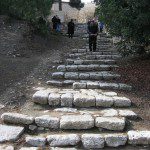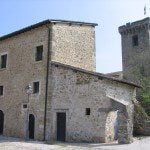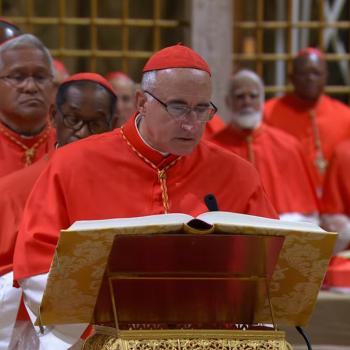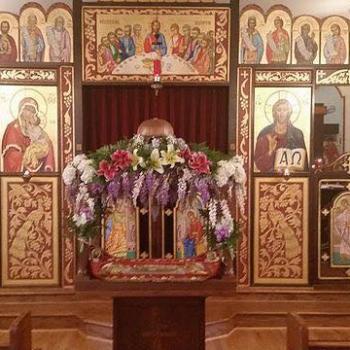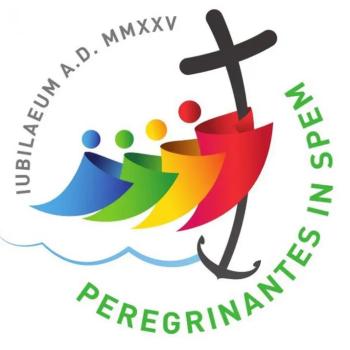![IMG_0403[1]](http://wp.production.patheos.com/blogs/labmind/files/2016/01/IMG_04031-300x225.jpg)
![IMG_5876[1]](https://wp-media.patheos.com/blogs/sites/613/2016/01/IMG_58761-225x300.jpg) Last week I had a chance to visit the only eastern rite parish of my diocese, the Melkite Church of Saint Ignatios of Antioch in Augusta, Georgia. The Melkite Church traces its roots to the ancient city of Antioch where Saint Peter himself founded a Christian community before going to Rome. It was in Antioch that disciples of Jesus were first called Christians, and its third bishop, Saint Ignatius, was the first to describe the Church as Catholic.
Last week I had a chance to visit the only eastern rite parish of my diocese, the Melkite Church of Saint Ignatios of Antioch in Augusta, Georgia. The Melkite Church traces its roots to the ancient city of Antioch where Saint Peter himself founded a Christian community before going to Rome. It was in Antioch that disciples of Jesus were first called Christians, and its third bishop, Saint Ignatius, was the first to describe the Church as Catholic.
The Melkite Church received that name after the Council of Chalcedon (AD 451) where not all Christians recognized the teachings of the Council. Those living within the Eastern Roman Empire (or Byzantine Empire) who accepted the teachings, along with the emperor, became known as Melkites, derived from the Syriac word malko which means “royal” or “kingly.” Use of this term distinguished those who followed the orthodox teaching of Chalcedon (which was supported by the emperor) from those Churches who did not recognize Chalcedon, primarily its teaching on the two natures of Christ. Today, the Churches that did not recognize the Council of Chalcedon are known as the Oriental Orthodox or non-Chalcedonian Churches such as the Armenian Apostolic Church, the Coptic Orthodox Church, and Syrian Orthodox Church. ![IMG_7216[1]](https://wp-media.patheos.com/blogs/sites/613/2016/01/IMG_72161-225x300.jpg)
I visited Saint Ignatios for the first time when I was a senior in high school. My religion teacher, who was a parishioner of Saint Ignatios, invited us to attend Divine Liturgy. As an eighteen year old Catholic who had only twice visited a non-Roman Catholic Church, I was stunned by the beauty of Saint Ignatios. Every inch of its walls and ceiling had icons. I was drawn into the mystery of the liturgy as Father Dan Munn chanted in tones I had never heard before, and everyone responded joyfully. I recall putting the booklet with the prayers down and simply watching the mystery unfold before me. ![IMG_8539[1]](https://wp-media.patheos.com/blogs/sites/613/2016/01/IMG_85391-225x300.jpg)
During that Divine Liturgy, eleven years after my first communion, for the first time, I was struck with an unquestionable conviction that Jesus Christ truly is present in the bread and wine which become his body and blood. I had always believed it, but as we prayed together the prayer before communion of the Divine Liturgy of Saint John Chrysostom, I had no doubt that the words of Jesus Christ were true, “this is my body… this is my blood.” I share with you this beautiful prayer. A prayer through which Christ strengthened my belief in His true presence in the Eucharist:
I believe and confess, Lord, that You are truly the Christ, the Son of the living God, who came into the world to save sinners, of whom I am the first. I also believe that this is truly Your pure Body and that this is truly Your precious Blood. Therefore, I pray to You, have mercy upon me, and forgive my transgressions, voluntary and involuntary, in word and deed, known and unknown. And make me worthy without condemnation to partake of Your pure Mysteries for the forgiveness of sins and for life eternal. Amen.
![IMG_3754[1]](https://wp-media.patheos.com/blogs/sites/613/2016/01/IMG_37541-225x300.jpg)
Loving Master, Lord Jesus Christ, my God, let not these holy Gifts be to my condemnation because of my unworthiness, but for the cleansing and sanctification of soul and body and the pledge of the future life and kingdom. It is good for me to cling to God and to place in Him the hope of my salvation. Receive me today, Son of God, as a partaker of Your mystical Supper. I will not reveal Your mystery to Your adversaries. Nor will I give You a kiss as did Judas. But as the thief I confess to You: Lord, remember me in Your kingdom.
The prayer is very much in the spirit of the publican’s prayer. It’s a prayer that recognizes the mystery of the Eucharist, and allows one to approach it aware of one’s own sinfulness and need for mercy. I find the last two lines very intimate, “I will not reveal Your mystery to Your adversaries. Nor will I give You a kiss as did Judas.” These words express total fidelity to Jesus Christ and utmost respect for the mysteries that occur during the liturgy. This is a simple, yet beautiful prayer that opened up my soul to be convinced that the Eucharist is the greatest gift Jesus has given us, and one that must be approached with awe are reverence.
Pictures are mine, all rights reserved.


